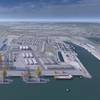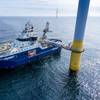Duisburg to Open New Trimodal Terminal
The largest trimodal container terminal in the European hinterland is being developed in the Port of Duisburg.
Duisburger Hafen AG (duisport) is set to build a US$111.2mln new 220,000 m² trimodal container terminal on the site of its current coal island in response to a sharp decline in coal handling as a result of the energy transformation.
The trimodal terminal is to be developed with duisport’s intermodal partners COSCO Shipping Logistics, Hupac SA and HTS Group and aims to handle the port’s booming trade with China in particular.
This is duisport's response to the sharp decline in coal handling resulting from the energy transformation. In the future, duisport will instead use the coal island in particular to handle the booming trade with China. The new terminal will be developed into the key European gateway hub, in particular to handle train traffic along the corridors of the New Silk Road, and will therefore operate under the name "Duisburg Gateway Terminal".
Even now, around 30 percent of all rail-based trade between China and Europe runs through the Port of Duisburg, which is the start and end point of the China trains. Currently, between 35-40 trains per week run between duisport and a dozen different destinations in China. The terminal will significantly increase the Port's capacities for trade with China.
In the future, up to 100 China-bound trains per week, rail traffic on the European rail corridors, in particular to Eastern and Southeastern Europe, and inland waterway services to seaports will be able to operate from the "Duisburg Gateway Terminal", which will thereby generate an annual throughput of around 850,000 standard containers (TEU) upon completion of the terminal.
"We are reacting to the changing market and are building Europe's largest container terminal in the hinterland on the coal island. In this way, we are consolidating our leading position in Chinese trade, creating jobs, and strengthening NRW as the most important logistics location in Europe," explains duisport's Chief Executive Officer Erich Staake.
On the 240,000 square meter area in the Port of Duisburg, 220,000 square meters are planned for the terminal and 20,000 square meters for warehouses. Six gantry crane systems, 12 block train platforms with a track length of 730 meters each, 5 loading areas and 3 berths for inland vessels, as well as a container storage area of 60,000 square meters will ensure rapid container handling in two construction stages.
Pre-carriage and onward carriage of goods at the trimodal terminal are to be handled primarily by water and rail. The investment volume amounts to around EUR 100 million. The terminal is set for commissioning in 2022.
Since the China trains increasingly represent a cost-effective alternative to air transport, the "Duisburg Gateway Terminal" will also contribute to improving the CO2 balance in NRW and Germany. The savings potential is estimated at over 60 million tonnes per year.
"We are proud that, thanks to our network management, we have been able to acquire internationally operating partners for the realization of this outstanding project with international appeal," says Staake.
duisport and COSCO SHIPPING Logistics each hold 30 percent of the investment and operating company. With a fleet of 1,300 ships, the Shanghai-based COSCO SHIPPING Group is the world's largest shipping company. COSCO SHIPPING also holds stakes in 55 terminals worldwide. With its business division, COSCO SHIPPING Logistics, COSCO SHIPPING is a leading market player in the organization and handling of the China trains.
Hupac SA and HTS Group each hold 20 percent of the shares in the investment and operating company. The Swiss-based Hupac Group is the leading network operator in European intermodal transport. The Hupac network comprises 130 trains daily with connections between the largest European economic areas, as well as to Russia and Asia.
Today, the Duisburg area is already a central hub in Hupac’s network, with around 60 weekly trains at various local terminal locations. The capacity expansion with the "Duisburg Gateway Terminal" enables the bundling of traffic in the China transit, as well as improved network supply logistics, with Duisburg as the gateway in the heart of Europe.
HTS Group is a Dutch inland waterway transport company which, in addition to its own fleet of vessels, operates terminals in the Netherlands, Belgium, and Romania.










